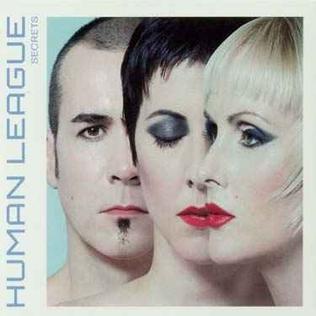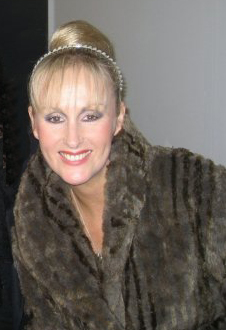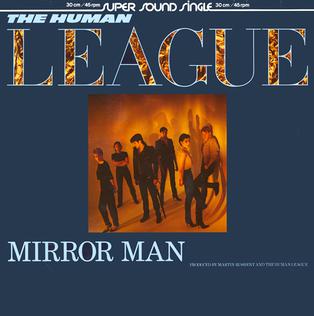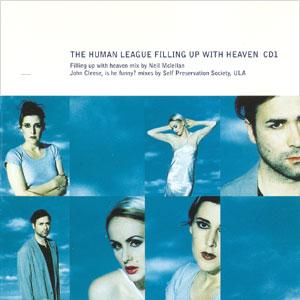
Heaven 17 are an English synth-pop band formed in Sheffield in 1980. The band were a trio for most of their career, composed of founding Human League members Martyn Ware and Ian Craig Marsh (keyboards) with vocalist Glenn Gregory.

The Human League are an English synth-pop band formed in Sheffield in 1977. Initially an experimental electronic outfit, the group signed to Virgin Records in 1979 and later attained widespread commercial success with their third album Dare in 1981 after restructuring their lineup. The album contained four hit singles, including the UK/US number one hit "Don't You Want Me". The band received the Brit Award for Best British Breakthrough Act in 1982. Further hits followed throughout the 1980s and into the 1990s, including "Mirror Man", "(Keep Feeling) Fascination", "The Lebanon", "Human" and "Tell Me When".

Crash is the fifth studio album by English synth-pop band the Human League, released on 8 September 1986 by Virgin Records. The album would provide the band with their second US number-one single, "Human", the same year. It was produced by the American production team of Jimmy Jam and Terry Lewis, who also wrote several tracks.

Philip Oakey is an English singer-songwriter who is the frontman and co-founder of the synth-pop band the Human League. Aside from the Human League, he has enjoyed an extensive solo music career and has collaborated with numerous other artists and producers.

Dare is the third studio album by English synth-pop band The Human League, first released in the United Kingdom in October 1981 and then subsequently in the US in mid-1982. The album was produced by Martin Rushent and recorded between March and September 1981, following the departure of founding members Martyn Ware and Ian Craig Marsh, and saw the band shift direction from their previous avant-garde electronic style toward a more pop-friendly, commercial sound led by frontman Philip Oakey.

Joanne Catherall is an English singer who is one of two female vocalists in the English synth-pop band The Human League.

Hysteria is the fourth studio album by the English synth-pop band the Human League, released on 7 May 1984 by Virgin Records. Following the worldwide success of their previous studio album Dare (1981), the band struggled to make a successful follow-up and the sessions for Hysteria were fraught with problems. The album title itself is taken from the problematic recording period. Producers Martin Rushent and Chris Thomas both left the project which would eventually be finished by producer Hugh Padgham.

Secrets is the eighth studio album by British synth-pop band The Human League. It was issued in 2001 by Papillon Records and was the Human League's first studio album in six years. The album was well-received by critics but performed poorly commercially.

Octopus is the seventh full-length studio album recorded by the British synth-pop band The Human League. It was produced by the former Tears for Fears keyboard player Ian Stanley and released by EastWest Records in 1995. It was the first new album from The Human League in five years after the termination of their long-term contract with Virgin Records. Octopus was the first Human League album that presented the band as a trio consisting of the singers Philip Oakey, Joanne Catherall and Susan Ann Sulley. The former Human League member Jo Callis and keyboard player Neil Sutton also contributed to the writing of the album.

Susan Ann Sulley, formerly known as Susanne Sulley and Susan Ann Gayle, is an English singer. She is one of the two female vocalists in the synth-pop band The Human League, contributing co-lead vocals on the conflicting duet "Don't You Want Me" with the band's founding member and lead singer Philip Oakey.

"The Lebanon" is a song by English synth-pop band the Human League, released as a single in April 1984. Written jointly by lead singer Philip Oakey and keyboard player and guitarist Jo Callis, it was the first single from the band's fourth album Hysteria. It was recorded at AIR Studios during 1983–1984.

"One Man in My Heart" is a song by English synth-pop band the Human League, written by Neil Sutton and Philip Oakey. It was released as the second single from the band's seventh album, Octopus (1995), on 6 March 1995 by East West Records. A ballad, the song differs from all previous Human League tracks as the lead vocal is performed by band member Susan Ann Sulley, with spoken-word refrains from Oakey and contrasting backing from the third member, Joanne Catherall. The song received positive reviews from music critics and peaked at number 13 on the UK Singles Chart, spending eight weeks in the top 100. Its music video was directed by Andy Morahan. In 2001, The Guardian newspaper named "One Man in My Heart" one of the best love songs of the 1990s.
Ian Craig Marsh is an English musician and composer. He was a founding member of the electronic band the Human League, writing and playing on their first two albums and several singles, until leaving in 1980 to form the British Electric Foundation and later Heaven 17.

"The Sound of the Crowd" is a song by the British synth-pop group The Human League. It became the band's commercial breakthrough, reaching #12 on the UK Singles Chart in May 1981.

"Open Your Heart" is a song by the British synth-pop group The Human League. It was released as a single in the UK in October 1981 and peaked at number six in the UK Singles Chart. It was written jointly by lead singer Philip Oakey and keyboard player Jo Callis. The song features a lead vocal by Oakey and female backing vocals by Susanne Sulley and Joanne Catherall, analogue synthesizers by Jo Callis, Philip Adrian Wright and Ian Burden. Drum machines, sequencing and programming were provided by producer Martin Rushent.

"Mirror Man" is a 1982 song by the British synth-pop group The Human League. It was released as a single in the UK on 12 November 1982 and peaked at number two in the UK Singles Chart. It was written jointly by lead singer Philip Oakey with keyboard players Jo Callis and Ian Burden, and produced by Martin Rushent.

Philip Adrian Wright is an English musician, also known as Adrian Wright.

"Filling Up with Heaven" is a song by English synth-pop band the Human League, released as the third and final single from their seventh full-length studio album, Octopus (1995). It was jointly written by lead singer Philip Oakey and producer Ian Stanley. The song was released on 5 June 1995 by East West Records in a variety of vinyl and CD single formats. These included various third-party remixes of "Filling Up with Heaven" and "John Cleese; Is He Funny?", including mixes by Hardfloor.

"Empire State Human" is a song by the British synth-pop group The Human League. The song was written by Philip Oakey, Martyn Ware and Ian Craig Marsh. It was co-produced by The Human League and Colin Thurston, and recorded at Monumental Studios in Sheffield.

"Soundtrack to a Generation" is a song by English synth-pop band the Human League. It is taken from the album Romantic?, from 1990.



















